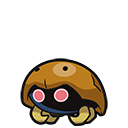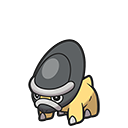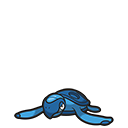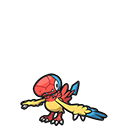Fossil: Difference between revisions
ArcToraphim (talk | contribs) m (→Trivia) |
|||
| Line 107: | Line 107: | ||
Two fossil Pokémon have been confirmed for {{g|X and Y}}. | Two fossil Pokémon have been confirmed for {{g|X and Y}}. | ||
{{p|Tyrunt}} is a {{2t|Rock|Dragon}} Tyrannosaurus with the Ability {{a|Strong Jaw}}. It is revived with a Jaw Fossil. | {{p|Tyrunt}} is a {{2t|Rock|Dragon}} Tyrannosaurus with the Ability {{a|Strong Jaw}}. It is revived with a Jaw Fossil. It evolves into {{p|Tyrantrum}}. | ||
{{p|Amaura}} is a {{2t|Rock|Ice}} Amargasaurus with the Ability {{a|Refrigerate}}. It is revived with a Sail Fossil. | {{p|Amaura}} is a {{2t|Rock|Ice}} Amargasaurus with the Ability {{a|Refrigerate}}. It is revived with a Sail Fossil. It evolves into {{p|Aurorus}}. | ||
===Appearance=== | ===Appearance=== | ||
Revision as of 18:22, 20 September 2013
- If you were looking for the TCG set, see Fossil (TCG).
A Fossil (Japanese: カセキ Fossil) is a trace or piece of an organism from the past, such as a skeleton, shell, or leaf, preserved in the earth.
In the Pokémon world, Fossils of prehistoric Pokémon are items which can be recreated into a living version using techniques developed by the Devon Corporation and a research laboratory on Cinnabar Island. These two processes were supposedly developed independently of each other at around the same time. There are also scientists in the Oreburgh Mining Museum and the Nacrene Museum who can revive Fossils. However, due to the fact that the Fossil Pokémon is resurrected into the preserved corpse of the prehistoric Pokémon, the living Pokémon regenerated from the Fossil is not exactly the same as the Pokémon it was in the previous life since the process of reviving a Fossil Pokémon is actually done by extracting the broken genes from the Fossil and rebuilding them to recreate the missing parts that were decomposed before installing them onto the skeleton of the dead Pokémon. This may also imply that the revived Pokémon probably has no recollection of its past life.
Because of this method, ancient Pokémon are commonly called Fossil Pokémon. They are always part Rock-type. It is unknown if this is because that's the way they were in the past and their Rock-type allowed them to leave behind more complete remains, or if their Rock-type status is a side effect of their origins.
Prior to Generation IV, Fossils were key items. However, in Generations IV and V, they are just normal items.
In the games, relatively few Pokémon Trainers possess Pokémon revived from Fossils, since they are considered rare and difficult to obtain.
In the games
Generation I
In Pokémon Red, Blue, and Yellow, the first three Fossils were introduced. They have also appeared in most of the later games, with the only exceptions being Ruby, Sapphire, and Emerald. They can be resurrected into these respective Pokémon:

|

|

|
| Helix Fossil | Dome Fossil | Old Amber |
The Helix and Dome Fossils are chosen at the end of Mt. Moon, being guarded by a Super Nerd, but the player may only choose one to keep. The other one that the Super Nerd takes will be revived and put on display in the Safari Zone. The Old Amber is located in the secret part of the Pewter Museum of Science, which can only be accessed with HM01 Cut.
A scientist in the Pokémon Lab on Cinnabar Island can revive the Fossils.
During this generation (and their Generation III remakes), all Fossils are key items, and cannot be traded to other games to be revived.
Lance is the first Trainer to be seen with a Fossil Pokémon, possessing an Aerodactyl due to its Dragon-like appearance.
Generation II
No new Fossils were introduced in Gold, Silver, and Crystal. However, Omanyte, Kabuto and Aerodactyl are prominently featured in the puzzles located at Ruins of Alph. Of the three, only Aerodactyl is actually obtainable in the games via an in-game trade with an NPC in Kanto (for Chansey); Omanyte and Kabuto must be traded from Generation I.
Lance, who is now the Pokémon Champion, continues to have an Aerodactyl on his team. In addition, Brock, being a Fossil enthusiast, has an Omastar and a Kabutops in this generation's games, as well as the Stadium games in Gym Leader Castle. His fondness of Fossils is referenced again in the next generation of games when a man in Mt. Moon mentions that Brock helps excavate Fossils at the location, which implies that he excavated Omastar and Kabutops's Fossils himself.
Generation III
In Pokémon Ruby, Sapphire, and Emerald, two new Fossils were introduced. These Fossils also appear in the Generation IV and Generation V games. They can be resurrected into these respective Pokémon:

|

|
| Root Fossil | Claw Fossil |
Additionally, Relicanth is also an ancient Pokémon which is partially Rock-type, and it can be considered a living fossil. However, since it survived extinction for approximately a hundred million years and can be caught in the wild instead of being revived from a Fossil, it is rarely included in the Fossil Pokémon group.
Steven Stone, a rock collector whose father is head of the Devon Corporation, has two Fossil Pokémon, Armaldo and Cradily. In Emerald, Roxanne will eventually gain an Aerodactyl, an Omastar, and a Kabutops for her team. Also, in FireRed and LeafGreen, Lance continues to have Aerodactyl on his team.
In Pokémon Colosseum's Story Mode, various characters use the Hoenn Fossils, including Relicanth. The most famous of these users are Miror B. and Gonzap, of whom each has at some points an Armaldo on his team. In Pokémon XD: Gale of Darkness, this relative ubiquity is cut considerably, with Lileep, Anorith, Cradily, and Armaldo only appearing once. That said, Relicanth deserves special mention as a member of Zook's team, while an Aerodactyl will appear on Greevil's team once his Shadow Pokémon are Snagged.
FireRed and LeafGreen Fossils are obtained the same way as in Generation I, while Ruby, Sapphire, and Emerald Fossils may be revived by a scientist in the Devon Corporation building in Rustboro City.
Generation IV
In Pokémon Diamond, Pearl, and Platinum, two new Fossils were again introduced:

|

|
| Skull Fossil | Armor Fossil |
These Fossils can be turned into Pokémon at the Oreburgh Mining Museum.
In Platinum, whichever Fossil a player digs up will depend on whether the Trainer ID is even or odd. If the Trainer ID is even, the player will dig up Armor Fossils only, and if the Trainer ID is odd, the player will dig up Skull Fossils only.
In Sinnoh, when players travel underground, they can find most of the Fossils by digging, along with several other rare items, potentially. After getting the National Pokédex, they can also find the five Fossils from the previous three generations.
In Johto's Generation IV games, the Dome and Helix Fossils as well as the Old Amber can be found randomly by smashing rocks outside Ruins of Alph. Root and Claw Fossils can be found randomly by smashing rocks in the Cliff Cave. Fossils found in Pokémon HeartGold and SoulSilver can be revived at the Pewter Museum of Science.
In this generation, Fossils are considered to be normal items; as such, they can be held by a Pokémon and traded to another game.
Roark has a Cranidos, while his father, Byron, has a Bastiodon. Cranidos, Rampardos, and Shieldon can also be separately found when battling three lesser-known Trainers; this is done to account for coverage of seen Pokémon in the Sinnoh Pokédex. In the post-Elite Four stage of the games, Aerodactyl can be spotted with another Trainer.
As in Pokémon Gold, Silver, and Crystal, Brock has an Omastar and a Kabutops on his team in HeartGold and SoulSilver and also uses a Rampardos in rematches. Lance continues to have Aerodactyl on his initial team, but it is not used in rematches.
Generation V
Pokémon Black and White once again brought a new set of Fossils to the Pokémon world:

|

|
| Cover Fossil | Plume Fossil |
These Fossils can be revived into Pokémon using a machine in the Nacrene City Museum.
In Unova, one of these two Fossils will be given away by a person in Relic Castle, similar to how the Helix and Dome Fossils are originally obtained in the Kanto-based games.
The two final evolutions of the Fossil Pokémon released in this generation (Carracosta and Archeops) are used by N in the final battle against him in N's Castle.
After defeating Ghetsis, Fossils of previous generations will be given out by a Worker in Twist Mountain, with one being given out per day.
Generation VI
Two fossil Pokémon have been confirmed for Pokémon X and Y.
Tyrunt is a Rock/Dragon Tyrannosaurus with the Ability Strong Jaw. It is revived with a Jaw Fossil. It evolves into Tyrantrum.
Amaura is a Rock/Ice Amargasaurus with the Ability Refrigerate. It is revived with a Sail Fossil. It evolves into Aurorus.
Appearance
Sinnoh Underground

|

|

|

|

|

|

|
| Helix Fossil | Dome Fossil | Old Amber | Root Fossil | Claw Fossil | Skull Fossil | Armor Fossil |
Pokémon Dream World
| Helix Fossil | Dome Fossil | Old Amber | Root Fossil | Claw Fossil | Skull Fossil | Armor Fossil |
In the anime

In the anime, most Fossil Pokémon are in fact, not extinct, but have simply been hibernating underground for millions of years, as seen in Attack of the Prehistoric Pokémon, Shell Shock!, and Fossil Fools. However, Professor Proctor and Gary have both used research to directly revive Fossil Pokémon, as seen in Where's Armaldo? and Putting the Air Back in Aerodactyl!, respectively. Unlike in the games where Fossils of ancient Pokémon are resurrected into the skeletons of the prehistoric using a machine that recreates the missing organs that had decomposed away from the genes extracted in the remains, this Aerodactyl was in fact completely revived from a Fossil that was fully preserved inside of an Old Amber for millions of years and thus still had the memories of its past life.
Butler tried to create a Groudon for Team Magma in Jirachi: Wish Maker from a fossilized remnant, but the expermiment failed and Butler left Team Magma.
Roark, as he does in the games, has a Cranidos which evolves into a Rampardos. This Pokémon, as well as several other Fossil Pokémon, appear in A Gruff Act to Follow!, Wild in the Streets! and O'er the Rampardos we Watched!. Byron, his father, also has quite a collection in his Gym. This includes the Fossil Pokémon Kabuto, Kabutops, Omanyte, Omastar, Cradily and Armaldo, as well as a giant Claw Fossil. He also kept a Sunkern leaf Fossil that Roark found when he was younger.
In A Night in the Nacrene City Museum!, a Kabuto Fossil was first seen chasing Hawes, as he claimed it to be doing, but was later seen safely placed in a display case. Hawes later explained what it was to the trio. It was later revealed that the Yamask in the Nacrene City Museum was using its move Psychic to make the Dome Fossil float and chase after Hawes after he put its mask in a display case, thinking that it was a replica Yamask mask given to him as a gift from the company that made a Cofagrigus replica after purchasing it from them for the museum.
Lenora gave a Plume Fossil to Professor Juniper and Fennel prior to Archeops In The Modern World!. They successfully resurrected a female Archen from the Fossil using Musharna's dream energy. With the help of Ash and his Tranquill, Archen learned how to fly and then evolved into Archeops.
In the manga
In the Pokémon Adventures manga, Lance and Brock both have Fossil Pokémon, just as in the games. Misty also temporarily has an Omanyte, but she gives this to Yellow. In addition, Red uses Blaine's laboratory to revive an Aerodactyl. In Hoenn, Ruby fights two revived Pokémon at a house in Fallarbor Town. Finally, in Sinnoh, Roark has a Cranidos like in the games, and his father a Shieldon.
In the TCG
All Fossils have appeared in the TCG at one point or another, usually being released in the same expansion as the Pokémon which are revived from them, and being released as Trainer cards. Initially, only the Mysterious Fossil card existed, which could be evolved into any of the three Generation I Fossil Pokémon; however, its use was eventually discontinued in favor of individual Dome Fossil, Helix Fossil, and Old Amber cards to match the Claw, Root, Skull, Armor Fossil, Cover Fossil, and Plume Fossil cards.
Trivia
- The Generation I Fossil Pokémon are the only Rock-type Pokémon of that generation that are not part Ground-type.
- In Generation I, Fossil Pokémon could not learn any Rock-type moves.
- Generation II is the only generation not to introduce any new Fossil Pokémon.
- Cranidos and Rampardos are the only Fossil Pokémon that are pure-Rock type.
- Tirtouga and Carracosta are the only Fossil Pokémon to have Rock as their secondary type.
| Types of items | |
|---|---|
| General | Evolution stones • Fossils • Flutes • Shards • Held items Evolution items • Escape items • Exchangeable items • Valuable items Battle items • Scents • Nectars • Candy • Ingredients |
| Medicine | Status condition healing items • Vitamins • Feathers Mints • Mochi • Drinks • Herbal medicine |
| Berry and Apricorn | Poké Balls • Apricorns • Berries • Mulch |
| Aesthetic | Decorations • Accessories • Backdrops • Props • Décor Clothing (XY • SMUSUM • LGPE • SwSh • BDSP • LA • SV) |
| Other | Mail • Key Items • Event items Wonder Launcher items • Rotom Powers |

|
This item article is part of Project ItemDex, a Bulbapedia project that aims to write comprehensive articles on all items. |

